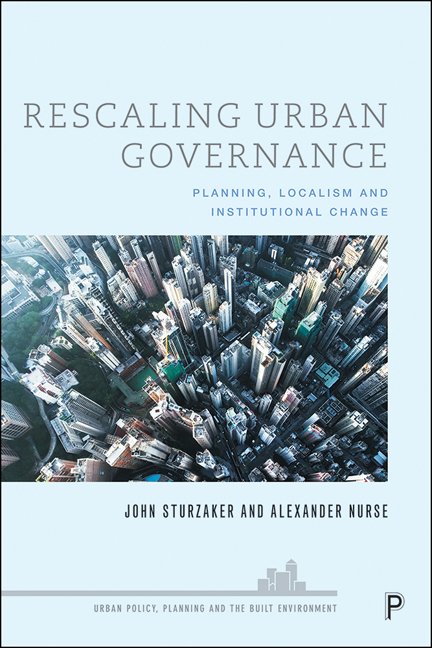Book contents
- Frontmatter
- Dedication
- Contents
- List of Tables, Figures and Boxes
- Notes on Authors
- Glossary
- Acknowledgements
- 1 Introduction: Planning Reform and State Spatial Rescaling
- 2 Devolution: A Patchwork Quilt of Planning Reform
- 3 Replacing the Regions: The evolution of English Subnational Reform
- 4 City Regions and the Cities Within Them: Connecting two Overlapping Scales
- 5 Local Authorities: Powerhouses or Scapegoats?
- 6 Community-led Governance: Opportunities and Constraints
- 7 Conclusion: Rescaling Urban Governance
- References
- Index
6 - Community-led Governance: Opportunities and Constraints
Published online by Cambridge University Press: 03 March 2021
- Frontmatter
- Dedication
- Contents
- List of Tables, Figures and Boxes
- Notes on Authors
- Glossary
- Acknowledgements
- 1 Introduction: Planning Reform and State Spatial Rescaling
- 2 Devolution: A Patchwork Quilt of Planning Reform
- 3 Replacing the Regions: The evolution of English Subnational Reform
- 4 City Regions and the Cities Within Them: Connecting two Overlapping Scales
- 5 Local Authorities: Powerhouses or Scapegoats?
- 6 Community-led Governance: Opportunities and Constraints
- 7 Conclusion: Rescaling Urban Governance
- References
- Index
Summary
Introduction
The notion of devolving power to local people, whether as communities or individuals, has a long history but became a focus of academic attention from the late 1960s onwards, with the oftquoted landmark work of Arnstein (1969). It has now become a cliché for politicians, whether on the left, right or centre of the political spectrum, to boast of their commitment to (re-)empower citizens. Devolving or decentralising power to communities is a hard proposal to argue against – who is in favour of not giving people more say over their futures (Rodriguez-Pose and Sandall, 2008; Lord et al, 2017)? The popularity of the idea, however, hides a great deal of complexity and contention (Sturzaker and Gordon, 2017).
This chapter first presents a brief historical overview of communityled urban governance and selected international examples. It then looks in depth at experiences in England, an exemplary case study in complexity and contention since the introduction of policies such as Neighbourhood Planning through the Localism Act 2011 claimed to empower communities and citizens. There has been a great deal of entirely justifiable scepticism about this, with concerns including the likelihood of these powers being taken up mainly by the wealthy. Conversely, there may be scope for Neighbourhood Plans to play a progressive and emancipatory role in cities through allowing communities to challenge decisions made by city governments and/ or create their own plans. This chapter includes some new empirical material on experiences of Neighbourhood Plan production in the North West of England, which casts an interesting new light on the role played by higher tier actors in framing and controlling community activity.
Community involvement in urban governance: A brief historical review
Damer and Hague (1971), in their early review of the evolution of public participation in planning, note that some discussions on the topic were taking place in the 1950s. Opposition to urban renewal in the USA and elsewhere in the 1960s is often credited with provoking larger-scale interest (Shipley and Utz, 2012), with keystone authors such as Jacobs (1961) and Arnstein (1969) bringing both polemical and theoretical arguments in favour of community involvement in planning.
- Type
- Chapter
- Information
- Rescaling Urban GovernancePlanning, Localism and Institutional Change, pp. 123 - 146Publisher: Bristol University PressPrint publication year: 2020



